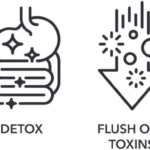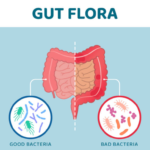
Poor Gut Health: How Can I Fix An Imbalanced Microbiome?
Many people experience digestive issues without realizing they may have poor gut health. Symptoms such as bloating, fatigue, and irregular bowel movements are common signs of poor gut health. Recognizing these signs early can help prevent more serious problems and improve overall well-being.
I’ve had times when my body didn’t feel right. I’d search online to determine why I was bloated or tired. Learning that about 70 million Americans deal with digestive issues annually shocked me. It made me think about how many people ignore gut health problems because they don’t know the signs.
Our gut does so much for us every day. It breaks down food, removes toxins, fights off sickness, and even makes us feel happier. But when our gut bacteria are out of balance, it causes many problems. Symptoms can range from tummy troubles like diarrhea and constipation to fatigue, sleep problems, and skin conditions.
Feeling tired all the time could be due to issues with serotonin, a chemical our gut produces. Food allergies, sugar cravings, and mood changes are also linked to gut health. It’s important to spot these signs early. Luckily, we can improve our gut health. Taking probiotics, drinking enough water, eating well, and managing stress can help alleviate these problems.
Key Takeaways
- Digestive health is crucial for mood, energy, and overall well-being.
- Signs of an unhealthy gut include bloating, constipation, fatigue, and skin issues.
- Poor gut health can impair nutrient absorption and lead to food intolerances.
- Managing stress, hydration, and diet can significantly boost gut health.
- A balanced gut microbiome is crucial for maintaining physical and mental health.
Common Signs of Poor Gut Health
Identifying an unhealthy gut is essential but can be tricky. Symptoms like digestive issues, constant tiredness, sleep problems, and food intolerances may indicate a problem. These issues suggest our gut microbiome might be out of balance.
Digestive Problems and Their Impact
About 70 million Americans face digestive diseases annually, from irritable bowel syndrome (IBS) to acid reflux. Gas, bloating, constipation, diarrhea, and heartburn are typical signs. They show trouble in how our body processes food and waste, hinting at an unbalanced gut flora.
Fatigue and Low Energy
Chronic fatigue is common with IBS, showing the link between our energy levels and poor gut health. Almost half of those with chronic fatigue syndrome also suffer from IBS. This points to a connection with a bacterial imbalance in the gut, affecting energy extraction and usage from food.
Sleep Disturbances
Our gut health profoundly influences sleep quality and patterns, including insomnia. Most of our serotonin, which affects mood and sleep, is produced in the gut. Poor gut functionality can disrupt sleep and cause fatigue, disrupting a healthy sleep routine.
Food Intolerances
Problems digesting certain foods can lead to bloating, gas, diarrhea, nausea, and discomfort, indicating food intolerances. This underlines the need for a healthy gut. Harmful gut bacteria may also trigger autoimmune diseases like thyroid issues, rheumatoid arthritis, and diabetes, emphasizing the role of gut health.
| Common Symptoms | Potential Causes | Related Data |
|---|---|---|
| Gas, Bloating | IBS, GERD | Affects 70 million Americans |
| Chronic Fatigue | Gut Bacterial Imbalance | 50% overlap with IBS |
| Insomnia | Poor Gut Health | The majority of serotonin production in the gut |
| Food Intolerance | Improper Digestion | Symptoms: bloating, gas, diarrhea |
The Gut Microbiome’s Impact on Poor Gut Health
Understanding the gut microbiome is critical to our health. Our bodies have about 40 trillion bacterial cells, which is more than our human cells. These bacteria, weighing as much as the brain, help digest our food, neutralize harmful substances, and fight off disease.
Why a Balanced Microbiome is Essential for Preventing Poor Gut Health
A balanced microbiome is crucial for getting energy from food and producing essential neurotransmitters like serotonin. It’s made of roughly 1,000 types of bacteria that keep us healthy. But, if the balance is off and bad bacteria outweigh good ones, it can cause weight gain and health issues. Probiotics with Bifidobacteria and Lactobacilli can help manage IBS symptoms and support weight management.
How Poor Gut Health Affects Mental Health and Mood
Our gut health also affects our brain. A healthy gut can help manage mental health disorders like depression and anxiety. Experts have found that the gut communicates with the brain, influencing our mood and behavior. Eating foods high in fiber and fermented products can boost good bacteria, which helps improve mental health.
The Connection Between Poor Gut Health and a Weakened Immune System
The gut microbiome is critical for our immune system health. It helps our body respond to infections and keeps things in balance. The bacteria in our gut help support our immune system. However, an imbalance can weaken our defense against illnesses. Studies show how the gut affects various health conditions, including autoimmune and digestive diseases.
Modern living affects our gut health in many ways. High stress, not enough sleep, and bad diets are to blame. These diets are full of processed foods and sugars.
The Role of Diet and Nutrition in Avoiding Poor Gut Health
The Western diet contains processed foods, sugars, and fats, which harm our gut’s good bacteria. Too many harmful bacteria can cause inflammation and disease. What we eat affects our gut microbes and cravings. For instance, yeast loves sugar, which can mess up our gut. Up to 20% of people have food intolerances, which can lead to digestion issues, bloating, and stomach pain.
Stress Levels
Stress has a significant impact on our gut by changing how it works. This can cause stomach issues and even skin problems. Conditions like acne and psoriasis can arise. Many with irritable bowel syndrome also face depression or anxiety.
Sleep Quality
A healthy gut helps us sleep well. But poor sleep can cause gut issues, creating a cycle. Serotonin, essential for mood and sleep, is produced in the gut so that poor sleep can worsen gut problems.
Use of Antibiotics
Antibiotics kill both harmful and helpful bacteria, disrupting the gut. This can lead to a loss of good bacteria and an increase in harmful ones. Conditions like SIBO and IBD can result. It’s vital to understand antibiotics’ effect on the gut.
Tackling these gut health factors means examining our whole lifestyle, including our diet, stress levels, sleep, and antibiotic use. A holistic approach can boost our gut health and overall well-being.
Key Signs of Poor Gut Health and How to Recognize Them
Understanding the signs of an unhealthy gut is vital to staying healthy. After all, our gut is home to trillions of microorganisms, including bacteria and viruses. In fact, these organisms play a critical role in maintaining our overall health. However, constipation, diarrhea, gas, and bloating often signal gut health imbalances.
A gut microbiome that’s off balance can affect our immune function. Almost 70% of the immune system is located in the gut. Poor gut health can cause problems like irritable bowel syndrome (IBS) and inflammatory diseases. Chronic regular heartburn suggests bacterial imbalances, while inflammation can mess with our sleep, leading to insomnia.

In addition to digestive symptoms, gut health problems can appear outside the digestive system. For example, sudden weight changes may indicate how well we absorb nutrients. Similarly, when it comes to skin health, frequent acne or eczema might suggest that our gut microbiome is off balance. Moreover, brain fog, mood swings, anxiety, and depression can all stem from gut issues as well.
Furthermore, developing food intolerances, such as feeling nauseous or bloated, can signal trouble with gut bacteria. These bacteria also help regulate serotonin production, influencing our mood and sleep. Likewise, conditions like psoriasis and celiac disease are closely tied to long-term inflammation and poor gut health.
Additionally, diabetics often have different gut bacteria, illustrating the strong connection between the gut and various diseases. Finally, an imbalanced gut microbiome can also trigger migraines due to nutrient deficiencies. Therefore, recognizing these signs is crucial for maintaining gut health and protecting overall well-being.
How to Restore a Healthy Gut
Getting a healthy gut involves changing what we eat and how we live. By adding good habits every day, we help our gut microbes flourish. Let’s look at the best ways to maintain a healthy gut.
Probiotics and Prebiotics
Eating foods like yogurt, kefir, and kimchi adds beneficial bacteria to our gut, which is key for a balanced gut. Prebiotics in garlic, onions, and bananas feed these good bacteria, helping our gut ecosystem stay strong.
Hydration
Drinking enough water is critical for digestion and gut health. Water moves food through our digestive tract smoothly. Drinking at least eight glasses a day helps digestion and supports healthy gut bacteria.
Healthy Diet Practices
Eating right is critical for a healthy gut. A study in 2019 showed eating lots of veggies, fruits, and grains helps. It boosts good bacteria like Lactobacillus and Bifidobacterium. Eating a variety of foods and limiting sugar is also essential for gut balance.
Regular Exercise
Workouts do more than keep us fit. They also make our gut bacteria diverse, which is beneficial. A review in 2021 showed that athletes have a wide variety of gut bacteria. This points to exercise being great for our gut.
Stress Management
Too much stress hurts our gut by letting bad bacteria create inflammation. Techniques like mindfulness and getting enough sleep help our gut health. Not getting enough sleep changes our gut bacteria. So, sleeping well and managing stress is vital for a healthy gut.
We can fully support our gut health by eating the right probiotic and prebiotic foods, staying hydrated, eating healthily, exercising, and managing stress. These steps promote a balanced and healthy gut microbiome.
When to Seek Medical Advice
If your gut issues persist, it’s time to seek medical advice for gut health. Chronic digestive troubles, disrupted sleep, mood swings, skin problems, and autoimmune signs should prompt a visit to the doctor. Regular digestive system check-ups are crucial to staying healthy and catching issues early.
The Importance of Regular Check-ups
About 70 million Americans experience digestive problems every year. Knowing when to seek help is crucial. Use your annual health check-up to discuss your gut health. Report any bloating, diarrhea, or stomach pain, as these might indicate a more significant issue.
Considering Nutrition Counseling
Not getting better even after making lifestyle changes? In that case, you might need nutrition counseling. A dietitian can identify food-related issues and create a personalized diet plan for you. Additionally, places like Birmingham Gastroenterology suggest cutting out foods that cause inflammation, using probiotics, and eating more foods that benefit your gut.
Red Flag Symptoms to Watch For
Experiencing “red flag” symptoms also signals it’s time to talk to a doctor. Such symptoms include:
- Unexplained abdominal pain
- Weight loss
- Blood in stool
- Significant changes in how often you go to the bathroom
Frequency of Bowel Movements
Dr. Seabrook states it’s normal to have bowel movements ranging from once every three days to three times daily. But if your bathroom habits change a lot or if you have other worrying signs, get help. Troubles, like not sleeping well or feeling tired, could always mean your gut is off balance and needs expert care.
Gut Health and Breastfeeding
Breastfeeding supports babies’ gut health due to the protective substances found in breast milk. Dr. Seabrook also recommends probiotics for unexplained gut problems like diarrhea, bloating, and gas. Eating plenty of fiber is also essential. It regulates water in stools, helping with both diarrhea and constipation.
Conclusion
Recognizing when your gut health is compromised is the first step toward improvement. Signs such as bloating, bowel movement issues, acid reflux, and skin problems are clear warnings. Fortunately, you can improve your gut health by eating better, managing stress, and sleeping well. In addition, foods like yogurt, kefir, sauerkraut, and whole grains are beneficial. They help the good bacteria in your gut and improve how it functions.
On the other hand, stress and poor eating habits significantly harm your gut health. Therefore, eating less processed food and reducing sugar and fat dramatically helps. Furthermore, eating fiber-rich foods and fermented options, like kimchi and miso, is also advantageous. Additionally, foods with collagen, like bone broth and salmon, can support gut health too. Moreover, drinking plenty of water is essential for maintaining a healthy gut.
In summary, simple steps like drinking enough water, eating a balanced diet, and managing stress will help you stay healthy. You can prevent issues from escalating by monitoring your gut health and making wise choices. However, if problems persist, it’s wise to consult a doctor. This way, they can ensure you don’t overlook anything serious. Choosing a healthy lifestyle ultimately helps keep your gut in good shape, improving your overall health and quality of life.
FAQ
Q: What are the signs of an unhealthy gut, and how can I address them?
A: Signs of an unhealthy gut include issues like gas and bloating. You might also have constipation, diarrhea, or heartburn. Feeling tired, having trouble sleeping, and not handling certain foods well are clues.
Add probiotics to your diet to tackle these, and drink plenty of water. Manage your stress and eat a balanced diet. Regular exercise helps; see a doctor if problems don’t go away.
Q: What are some common unhealthy gut signs?
A: Common signs include tummy troubles, constant tiredness, poor sleep, and poor reaction to some foods. These signs suggest your gut balance is off. It’s essential to get it back on track for your health.
Q: How does the gut microbiome affect my health?
A: Your gut microbiome is essential for good health. It helps extract energy from food and removes toxins, supporting your overall well-being.
Q: What factors lead to poor gut health?
A: Consuming excessive processed food and sugar disrupts gut health. Stress, poor sleep, and overuse of antibiotics also contribute. These factors harm the beneficial gut bacteria.
Q: What are some symptoms of poor gut health?
A: Poor gut health can cause stomach problems and unexpected weight changes. You might get skin issues, feel tired, or notice food making you feel bad. Headaches, autoimmune diseases, and mood changes also hint at gut trouble.
Q: How can I restore a healthy gut?
A: To improve gut health, eat foods rich in probiotics and prebiotics. Ensure you’re drinking enough water. Eating a healthy diet, exercising, and reducing stress will also help restore balance to your gut bacteria.
Q: When should I seek medical advice for gut health?
A: If gut problems like digestion or sleep problems don’t disappear, it’s time to see a doctor. Also, check if you notice mood swings, skin problems, or autoimmune issues. Regular talks with your doctor can keep your gut in check.
Source Links
How to Improve Gut Health
- How to Improve and Reset Gut Health
- How to Reset Your Gut in 3 Days
- What doctors wish patients knew about improving gut health
- 5 Signs Of An Unhealthy Gut & Ways To Improve It – Birmingham Gastroenterology Associate
- Discover the 7 Signs of an Unhealthy Gut and Learn How Nutritional Therapy Can Help Heal It — My Functional Medicine Clinic
- 7 signs of an unhealthy gut and how to improve it
- 10 Signs of an Unhealthy Gut and How the Best Probiotics Can Help
Signs of an Unhealthy Gut
- Signs of an Unhealthy Gut and What You Can Do About It
- 10 Signs of an Unhealthy Gut
- Family Physician Shares Signs of Poor Gut Health
- Signs Of An Unhealthy Gut, According To Experts
- 7 Signs of an Unhealthy Gut – Gut Bacteria – Unhealthy Symptoms
- The seven signs of an unhealthy gut – and how to fix it
Gut Microbiome and Health
- How Does Your Gut Microbiome Impact Your Overall Health?
- Part 1: The Human Gut Microbiome in Health and Disease
- What Is Your Gut Microbiome?
Belli Health
Thank you! I appreciate your feedback. Gut health is important and hope to spread the ‘content’. 🙂
bizzlyn
Wonderful web site Lots of useful info here Im sending it to a few friends ans additionally sharing in delicious And obviously thanks to your effort













































4 comments